The Prince Edward Island media intelligentsia has been all aflutter for the past several weeks over the admittance to and subsequent expulsion of local blogger from the Legislative Assembly’s Press Gallery. Following on from the original story there’s been a column in the local newspaper and a panel discussion on the local morning radio show.
The common thread running through these discussions has been a tacit assumption that blogging is sort of “journalism lite.”
Guardian Editor Gary Macdougall used the phrase “hobby journalists” to describe what bloggers do, and underlying the CBC panel discussion was the notion that we all need to consume this stuff called “the news” and that there’s a battle between bloggers and journalists to see who’s going to deliver it in the future.
But these bloggers vs. journalists debates set up a false dichotomy: in straining to compare blogging to journalism commentators are making the mistake of assuming that because bloggers and journalists both “write about things,” they are, of necessity, somehow part of the same enterprise.
Comparing journalists to bloggers is like comparing journalists to poets or novel writers or songwriters or graffiti artists or priests: yes, we all interpret the human condition in our own peculiar ways, but the blogger is no more treading on the domain of a journalist than the poet is.
I’m a committed and passionate blogger: it’s deeply woven into the fabric of how I live. But the exciting thing about blogging for me is not its perceived abilities to “recast the news landscape,” it’s the notion that regular everyday citizens have, in the Internet, a publishing platform the likes of which we’ve never seen: low cost, low barrier to entry, global distribution of words and images.
And what’s exciting about that has nothing to do with the product and everything to do with the process.
What happens when, for all intents and purposes, everyone has a printing press and a television studio and is responsible to no entity but their own conscience when using it? How does that change public discourse? How does that change how people think about themselves in relation to society’s institutions? In a world where anyone can publish anything at any time, how do we attach value to our own small bit of the dialogue?
By obsessing on the “market for content,” we’re missing that the tranformational aspect of these “new media” isn’t about consumption but rather about production: what happens when we’re all free to create in ways that have heretofore been beyond the means of the common person?
Who cares what gets created – that’s simply the by-product – the heart of the matter is how it’s created, who is creating it, and what doing so does to them.
Obviously journalists need to be part both of interpreting this and considering its implications for what they do. But so do school children and portrait painters and guitar players and choreographers and ecologists.
I am not a journalist.
The words I write in this space I write for myself alone, without consideration for their consumption. I write about things that happen to me, things that interest me, things that happen in my neighbourhood and things that happen in the world.
If you happen to read what I write here, that’s great, but I’m not writing for you, and while I may be interested in your reaction to what I write, this blog is not about you, or what I’m writing about. It’s about how my life is enhanced by the very fact of writing itself.
That’s not journalism.
And because you have to be inside it to truly understand it, it’s not something that’s easily hashed out in a David vs. Goliath-style morning radio debate or a journalist’s newspaper column.
Should bloggers be able to join the Press Gallery? That’s no more than a bureaucratic diversion: the real and profound questions concern whether an engaged population of producers actually needs a Legislative Assembly at all.
Mila May Rukavina, born October 26, 2009. 8 pounds, 3 ounces. Mila and her parents [[Jodi]] and [[Johnny]] are all doing well. The plan to populate Prince Edward Island with little Rukavinas continues.
My friends Dan and Becky are, as Dan explains in a well-worded blog post, starting a venture called LearnToTravel designed to teach you how to become an independent traveler.
While I’m not entirely convinced that the best way to learn to become an independent traveler isn’t just throwing caution to the wind and going traveling, I also know that some people are just never going to do this: the great chasm of the unknown looms too great.
When Dan and Becky are trying to do, I think, is to plane off enough of the rough edges of your first trip to the point where you emerge confident enough to travel independently thereafter.
CBC launched a cross-platform re-branding of its news operation today. CBC Newsworld becomes CBC News Network, The National goes digital and mobile, and radio’s World Report gets a new host and a new feel. Central to the re-branding is complete graphic overhaul, and the heart of this is the use of Stag, a typeface originally commissioned for Esquire magazine and still the graphical heart of the magazine.
Stag is, I think, an excellent choice for the job, and the CBC has used it inventively. It is a little odd, however, to see a typeface so associated with Esquire used so prominently elsewhere:


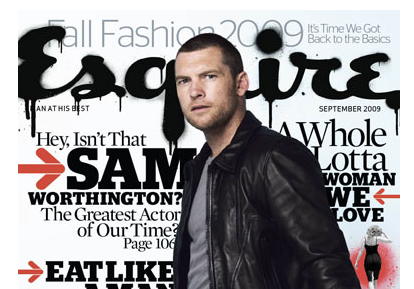

While looking through the collection of old videotapes in the collection of the Robertson Library at UPEI yesterday I came across and 1986 profile of Old Home Week reported by Scott Russell. Part of the profile included an interview with a young Kevin “Boomer” Gallant:
Here, 23 years later, is slightly-older Boomer Gallant, in a full-page newspaper ad for [[Compass]] that appeared in today’s Guardian:
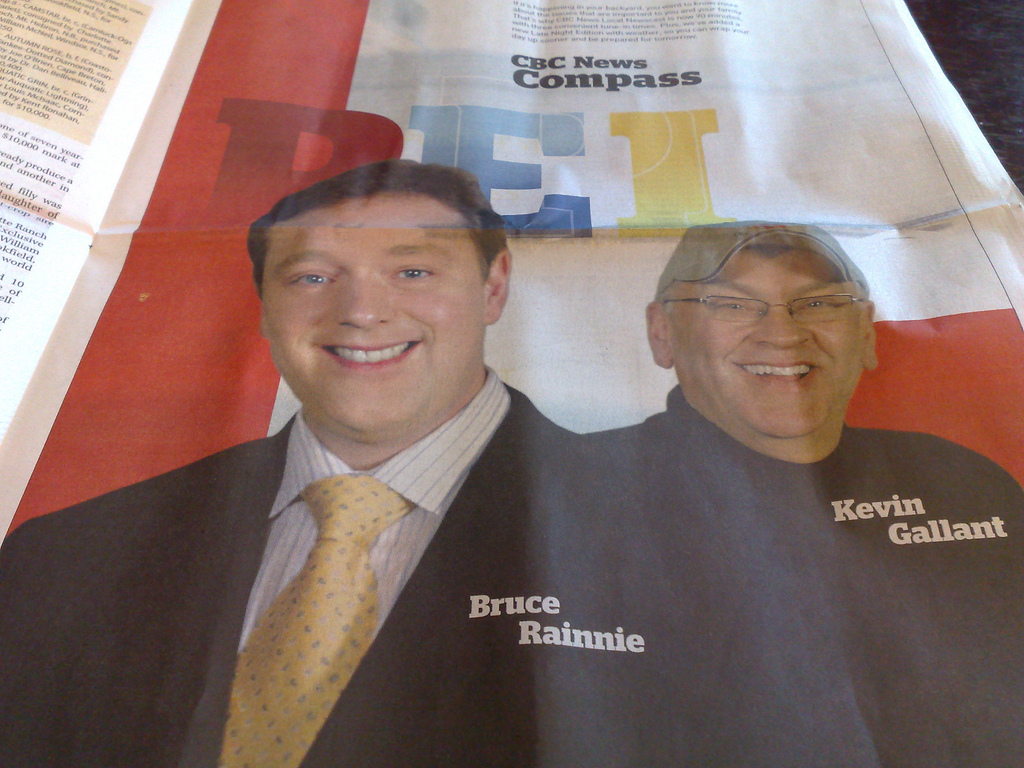
Update: The original UPEI cataloging record for the videotape listed it as being from 1976. When it turned out that Scott Russell would have been 18 years old if this were in fact the date – something helpful readers pointed out – Simon Lloyd at the Robertson Library dug further and found the date was incorrect: it was a 1986 profile. I’ve updated the post accordingly.
It’s not like this hasn’t happened before.
Back in 2007 I noted the existence, buried deep inside the Robertson Library at the University of PEI, of a mother lode of multimedia production gear, sitting under-loved and under-used, and lamented that word of such a powerful kit wasn’t being sung from the hills of Charlottetown.
This time around I’m determined to make sure that doesn’t happen, and the object of my determination this time around is the exciting new Collaboratory that opened recent in the library, this time in full public view and with absolutely no barriers to use.
I initially thought that collaboratory was a goofy-sounding name full of pretense (keep in mind that the previous venture was called Arts Netlantic). That is until I learned that this is a bona fide concept, not a locally-brewed-up name:
A collaboratory, as defined by William Wulf in 1989, is a “center without walls, in which the nation’s researchers can perform their research without regard to physical location, interacting with colleagues, accessing instrumentation, sharing data and computational resources, [and] accessing information in digital libraries”
Okay, so that is somewhat pretentious.
But it actually does some justice to what you’ll find in the space formerly occupied by the “Media Centre” in the library: what used to be a dusty collection of barely-working turntables and cassette players surrounded by a dusty collection of long-playing records has been transformed into a multimedia playground drenched in high-end Mac computers with huge cinema displays and all the analog-to-digital transforming gear you could ever wish for along with all the digital editing software you’d ever need to create a Hollywood movie.
And it’s just there, waiting for you to come and use it. You don’t have to belong to the University, you don’t need a library card, you don’t need to sign up for anything, you don’t need a username or password: you just walk into the Library, go down the hall where the catalogue terminals are, turn left, and, blam, you’re in multimedia heaven ready to start creating.
Needless to say, I’ve been taking advantage of this new resource. Here’s Oliver using the video editing machine to create a video for Climate Action Day:
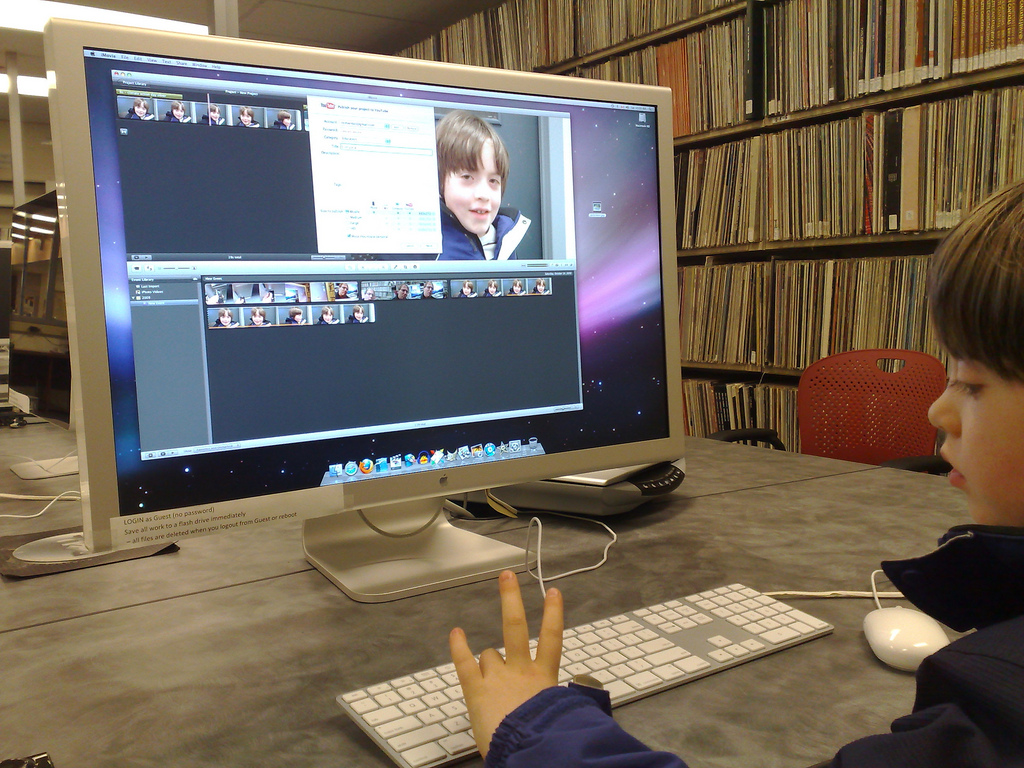
And here’s the workstation that lets you convert old VHS videotapes into digital video files:
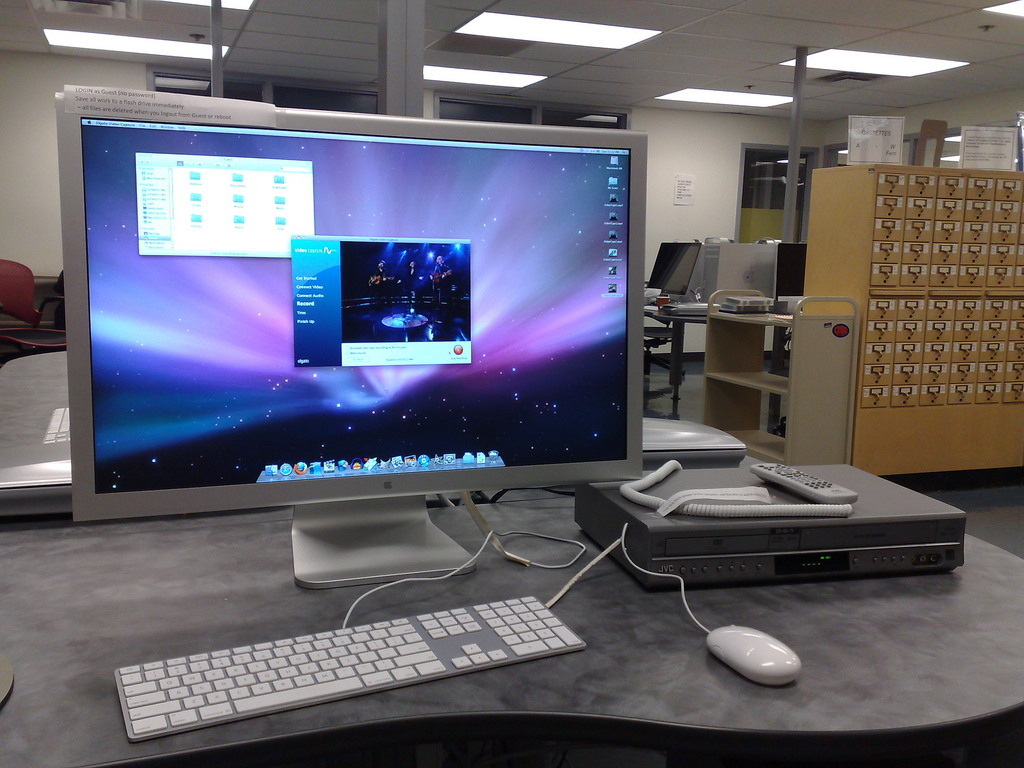
I went a little wild yesterday with the collection of VHS tapes that had been piling up in our cubbyholes since our last VCR broke down. Among them I found a recording of the Charlottetown-hosted 1996 East Coast Music Awards, from which I pulled:
- Northumberland Strait Bridge Television Commercial
- Bruce Guthro and Natalie MacMaster, Fiddle & Bow
- IslandTel Commercial (featuring Fred Morash)
- Gene MacLellan tribute featuring Lennie Gallant, Marty Reno, Tara MacLean
Those are all raw multi-megabyte MP4 video files, so you might want to find fast Internet before downloading (another benefit of the Collaboratory: really, really fast Internet).
I encourage you to take advantage of this great new resource, and when you do I encourage you to let the library staff know that this is what they should be doing more of.
I stumbled across a very helpful tool this afternoon while visiting the CBC website: the Master Planner from CBC Media Sales and Marketing is a web application that lets you explore the ratings and audience size of CBC programs by market and demographic.
If I enter “Charlottetown” as the “Market,” for example, “CBC News at Six” as the “Program,” “Fall 2009” as the “Season” and select “A2+” (short for “all viewers”) as the demographic, I learn that 23% of televisions in the Charlottetown market were watching the Compass, representing an estimated audience of 31,500.
Splitting this up demographically, in the “lucrative 18-24” demographic the rating is to 5.4% and in the “55+” demographic it’s 41.8%.
I think that means that “a lot more old people watch Compass.”
By contrast, The National has a 2.9% share and an estimated audience of 4,050, the Rick Mercer Report has a 3.8% share and an audience of 5,500 and the Sunday morning airing of Coronation Street has a 1.9% share and an audience of 2,880.
Looking across the country, Compass’ counterparts (assuming they’re all tagged CBC News at Six) have the following ratings share:
- Vancouver, 0.7%
- Edmonton, 0.45%
- Calgary, 0.6%
- Regina, 1.05%
- Winnipeg, 3.9%
- Toronto, 0.8%
- Montreal, 2.2%
- Halifax, 5.15%
- St. John’s/Cornerbrook, 10.4%
This means that 10,000 more people are watching the CBC News at Six in Prince Edward Island than are watching the CBC News at Six in Montreal (despite the fact that Montreal is, well, bigger).
By ratings, the ten most popular shows for the CBC Charlottetown market are:
- CBC News at Six (23.15%)
- CBC News at Five (8.9%)
- Jeopardy (6%)
- Coronation Street Primetime (5.3%)
- Hockey Night in Canada (5.3%)
- Wheel of Fortune (4.7%)
- Heartland (4%)
- Rick Mercer Report (3.8%)
- Nature of Things (3.6%)
- Figure Skating Championships (3.5%)
By contrast the most popular programs in the CBC Toronto market are:
- Jeopardy (4.3%)
- Hockey Night in Canada (4.2%)
- Harry Potter and the Order of the Phoenix (3.41%)
- Wheel of Fortune (3.38%)
- Rick Mercer Report (2.9%)
- Coronation Street Primetime (2.5%)
- Happy Feet (2.5%)
- Elf (2.3%)
- Ron James Show (2.3%)
- Best of Rick Mercer (2.1%)
Of those top 10 shows in Toronto, 3 are Hollywood movies, 2 are U.S. game shows, and 1 is a British soap. Only three are made-in-Canada: 2 Rick Mercers, a Ron James and the hockey.
So, it’s true what they say: lots of Prince Edward Islander’s watch Compass.
You gotta wonder about the Jeopardy and the Wheel of Fortune though. I guess running those imports five times a week is what lets the 5,000 Islanders watch the Nature of Things on Sunday nights?
My main out-of-home way of interacting with Twitter is through the Tweetie application on my iPod Touch. And one of my favourite features of Tweetie is its ability to automatically translate tweets from other languages. All I need to do is “swipe” the tweet in question, which calls up a set of icons; I click on the right-most one, click “Translate” and the tweet appears in English (or at least in Englishish) in a pop-up dialog:
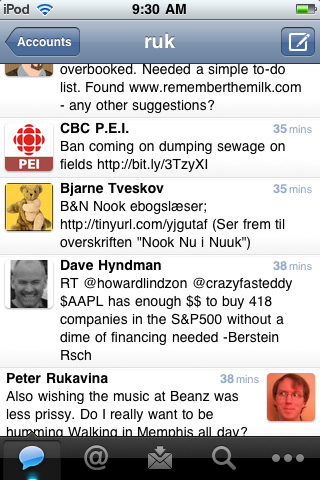
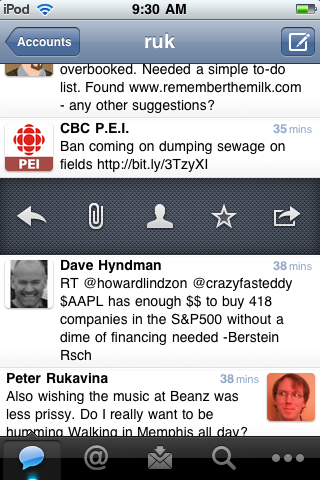

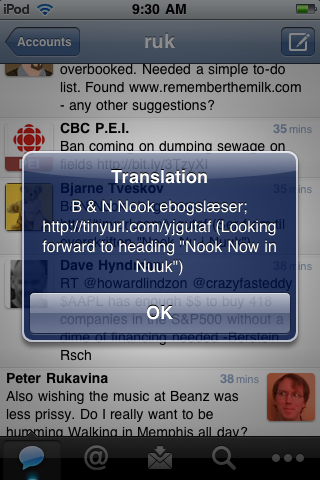
Bonus tip: on an iPhone or iPod Touch you can take a screen shot by pressing the “sleep” button (on the top of the device) and the “home” button at the same time; the screen will flash briefly to show you that you’ve succeeded, and the next time you sync your device your screen shots will appear in iPhoto for download.
 I am
I am